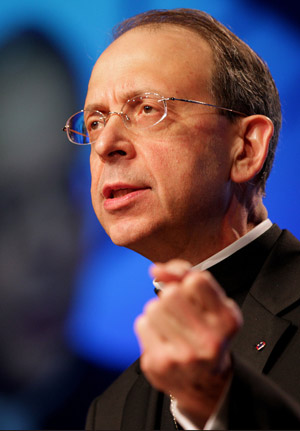WASHINGTON –– The Department of Health and Human Services’ contraceptive mandate and its extremely narrow religious exemption present problems both of principle and of practicality, according to the bishop who heads the Ad Hoc Committee for Religious Liberty.
 Bishop William E. Lori of Bridgeport, Conn., chairman of the bishops’ Ad Hoc Committee for Religious Liberty, said a religious right to conscience protection needs to be enacted into federal law, given the ongoing debate over a federal mandate requiring employers, including most religious entities, to provide no-cost contraception and sterilization coverage demonstrates. Bishop Lori is pictured during the 2011 National Catholic Prayer Breakfast in Washington. (CNS photo/Bob Roller)Bishop William E. Lori of Bridgeport, Conn., said in a Feb. 23 telephone interview with Catholic News Service that the “accommodation” announced Feb. 10 by President Barack Obama represents “an intrusion into the internal life of the church that we think is a violation of religious liberty.”
Bishop William E. Lori of Bridgeport, Conn., chairman of the bishops’ Ad Hoc Committee for Religious Liberty, said a religious right to conscience protection needs to be enacted into federal law, given the ongoing debate over a federal mandate requiring employers, including most religious entities, to provide no-cost contraception and sterilization coverage demonstrates. Bishop Lori is pictured during the 2011 National Catholic Prayer Breakfast in Washington. (CNS photo/Bob Roller)Bishop William E. Lori of Bridgeport, Conn., said in a Feb. 23 telephone interview with Catholic News Service that the “accommodation” announced Feb. 10 by President Barack Obama represents “an intrusion into the internal life of the church that we think is a violation of religious liberty.”
On a practical level, he added, the mandate as revised by Obama “does not really address how we are organized” as church institutions.
“It seems to me that for the government to ask us to override our teachings, whether popular or not, there has to be a compelling government interest,” Bishop Lori said. But he said 90 percent of insurers already cover contraceptives, with companies that object to contraception representing a “relatively small number” of employers.
“The insurance plans that are in question are good benefits packages, but they don’t include these things that are abundantly available elsewhere and at a reasonable cost, despite what is being said,” he added.
Obama’s revised mandate says religious employers could decline to cover contraceptives if they were morally opposed to them, but the health insurers that provide their health plans would be required to offer contraceptives free of charge to women who requested such coverage.
Bishop Lori questioned why the federal government would compel coverage of contraception but leave other decisions on “essential health services,” such as coverage of high blood pressure medication or HIV/AIDS drugs, to the states under the health reform law.
“It’s hard to see how that is a compelling government interest” when other important treatment decisions are left to the states, he said.
Asked about his Feb. 16 testimony before the House Oversight and Government Reform Committee, Bishop Lori said he “could not help but notice how polarized the committee is, as I think the whole Congress is.”
“The opportunities to engage and to look for points of commonality are few and far between,” he said.
But he said the Catholic bishops will work with any administration to advance the church’s social teachings in the areas of human dignity, solidarity and the common good. “Of course we want to work wherever we can and whenever we can toward the common good,” he said.
The HHS mandate “is not a Republican or Democratic issue,” Bishop Lori added. “It’s something that is an American issue and something that should concern us also at the level of our own (church) teachings.”
Bishop Lori joined with Cardinal Timothy M. Dolan of New York, president of the U.S. Conference of Catholic Bishops, in a Feb. 22 letter updating the nation’s bishops on the fight against the HHS mandate.
“This is not just about contraception, abortion-causing drugs and sterilization –– although all should recognize the injustices involved in making them part of a universally mandated health care program,” they wrote. “It is not about Republicans or Democrats, conservatives or liberals. It is about people of faith. This is first and foremost a matter of religious liberty for all.”
The letter called on Obama to “rescind the mandate, or at the very least, provide full and effective measures to protect religious liberty and conscience.”
The White House has said it will be arranging meetings with faith-based representatives, including the Catholic bishops, to discuss remaining problems with the HHS mandate, especially as it relates to self-insured employers.
A White House official told CNS Feb. 23 that planning for those meetings is still under way.
Cardinal Dolan and Bishop Lori urged Catholics to contact their members of Congress in support of passage of the Respect for Rights of Conscience Act, which was expected to come up for a vote as early as the beginning of March.
